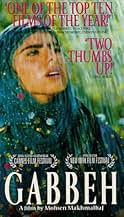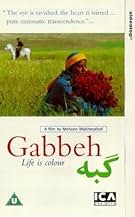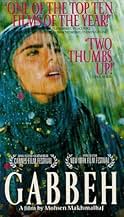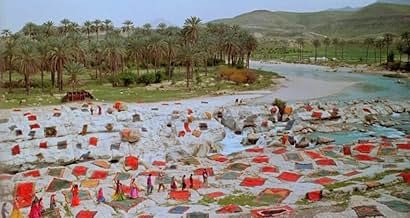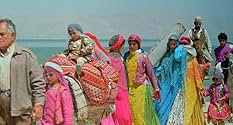IMDb-BEWERTUNG
6,9/10
3859
IHRE BEWERTUNG
Wenn ein altes Ehepaar ihren Gabbeh - eine Art Perserteppich - wäscht, erscheint auf magische Weise eine junge Frau und erzählt ihnen ihre Lebensgeschichte.Wenn ein altes Ehepaar ihren Gabbeh - eine Art Perserteppich - wäscht, erscheint auf magische Weise eine junge Frau und erzählt ihnen ihre Lebensgeschichte.Wenn ein altes Ehepaar ihren Gabbeh - eine Art Perserteppich - wäscht, erscheint auf magische Weise eine junge Frau und erzählt ihnen ihre Lebensgeschichte.
- Regie
- Drehbuch
- Hauptbesetzung
- Auszeichnungen
- 5 Gewinne & 5 Nominierungen insgesamt
Empfohlene Bewertungen
Is it racist to insist that this is the most beautiful film I have ever seen? I say racist, because much of what is 'merely' beautiful to me is part of a rich symbolic texture I couldn't always get; concentrating on aesthetics may seem to rob a film of its political force. That it has such force is proven by its being banned in its country of origin - Makhmalbaf's hiding behind allegory cannot disguise his impassioned analysis of poverty, the oppressiveness of tradition or the loneliness of women in a patriarchal society. This is a film full of nature's marvel, yet shows how 'nature' is often used to justify social repression - as the teacher's lesson demonstrates, if the creation of the gabbeh (an ornamental, narrative carpet) is art in nature's image, than nature (and the rules it inspires) is merely a recreation of ours.
Gabbeh, a movie from 1996, written, directed and edited by Mohsen Makhmalbah, capturing its story from a tiny scene depicted on a Persian rug: a pair of lovers riding the horse.
Gabbehs are one of the many varieties of Persian rugs. They are hand-knotted by women belonging to Lori, Bakhtiari or Qashqai clans: shepherds wandering with their flocks over the Iranian mountains and beyond.
A gabbeh is small sized while much thicker than other rugs; its surface is a symphony of colors: the yellow of the sun, the red of flowers, the blue of sky, the green of grass, all of them meeting there. Life is color, love is color, beauty is color: colors of surrounding nature extended on the clothes they wear and on the gabbehs they craft, these women living under the sun and the clouds, on the grass and among flowers.
As rich in colors as it is, a gabbeh has usually a very basic pattern, sometimes just a small scene some place on the rug.
I am thinking at those Chinese drawings in ink on rice paper, at one corner with a tiny fisherman in a small boat: it's telling a story, the size of a spot, and all the space that remains is just what? emptiness? Or maybe the whole is telling a much larger story? about the artist, about the making of the artwork? The gabbeh from this movie resembles those Chinese drawings in this detail: there is a small scene on the surface, the size of a spot. A pair of lovers on horseback; and the whole surface of the rug, exploding in colors, subtly supporting the tiny story.
An old couple is carrying their gabbeh to wash it in the river, as they've done everyday, for forty years. It's become a ritual.
A gabbeh and a ritual: we enter the realm of magic. And magic is what we see in this movie: the gabbeh is getting alive, becoming a young woman who's telling the story of the pair of lovers. A story that has lasted for forty years.
We associate rituals with religious practices, while they mean more. Rituals keep alive the collective memory of civilizations. The more primitive a civilization the more obvious.
A ritual, with its precise details, with its precise repetitions, is to keep the remembrance alive: to participate again at an event of significance; to cancel time and to live when the event actually took place. Participation, not reenactment. Father Alexandre Schmemann wrote an admirable book about the Eucharist as Mystery of the Kingdom: you'll find there some great pages about remembrance as participation, as canceling time and be there to witness the Passion, the Death, and the Resurrection.
The ritual of washing the gabbeh here in the movie is personal: the story of the pair of lovers is remembered by the old couple everyday: remembrance as participation, canceling of time.
But, as I said, this scene of two lovers riding the horse is just a tiny part of the whole surface of the rug: the story of love is remembered within the remembrance of that pastoral civilization: the clan of shepherds migrating over the Zagros mountains in search of grass for their flocks. A clan carrying, together with its animals, its primitive culture with severe rules and taboos, necessary for survival. A community kept alive through the force of its culture, a culture kept alive through carefully observed rituals.
And here Parajanov comes in mind, of course, and not only him: also the Chinese Tian Zhuang-Zhuang. They also depicted in their movies ancient communities kept alive by the force of rituals, of traditions, rules that are difficult to be understood as they defy logic: these rules express a cultural matrix, a system of values that defines the group as a whole.
What Makhmalbaf brings in this depiction of a patriarchal culture is the use of colors and sounds: these people have a special sensibility for colors, they spend their lives surrounded by the colors of nature, by the vivid colors of their female clothes, by the colors they put in their gabbehs. And as they spend all their life outside, these people have a special understanding of the language of sounds, be them sounds of the birds or animals, be them sounds of the grass in the wind, of the rocks on the footpaths in the mountains, or of the river. And Makhmalbah succeeded to give an active role in his movie to each sound, to each color: by the way they are placed, by the way they are repeated, by the way they come along with the feelings of people. This movie is a feast to watch.
Gabbehs are one of the many varieties of Persian rugs. They are hand-knotted by women belonging to Lori, Bakhtiari or Qashqai clans: shepherds wandering with their flocks over the Iranian mountains and beyond.
A gabbeh is small sized while much thicker than other rugs; its surface is a symphony of colors: the yellow of the sun, the red of flowers, the blue of sky, the green of grass, all of them meeting there. Life is color, love is color, beauty is color: colors of surrounding nature extended on the clothes they wear and on the gabbehs they craft, these women living under the sun and the clouds, on the grass and among flowers.
As rich in colors as it is, a gabbeh has usually a very basic pattern, sometimes just a small scene some place on the rug.
I am thinking at those Chinese drawings in ink on rice paper, at one corner with a tiny fisherman in a small boat: it's telling a story, the size of a spot, and all the space that remains is just what? emptiness? Or maybe the whole is telling a much larger story? about the artist, about the making of the artwork? The gabbeh from this movie resembles those Chinese drawings in this detail: there is a small scene on the surface, the size of a spot. A pair of lovers on horseback; and the whole surface of the rug, exploding in colors, subtly supporting the tiny story.
An old couple is carrying their gabbeh to wash it in the river, as they've done everyday, for forty years. It's become a ritual.
A gabbeh and a ritual: we enter the realm of magic. And magic is what we see in this movie: the gabbeh is getting alive, becoming a young woman who's telling the story of the pair of lovers. A story that has lasted for forty years.
We associate rituals with religious practices, while they mean more. Rituals keep alive the collective memory of civilizations. The more primitive a civilization the more obvious.
A ritual, with its precise details, with its precise repetitions, is to keep the remembrance alive: to participate again at an event of significance; to cancel time and to live when the event actually took place. Participation, not reenactment. Father Alexandre Schmemann wrote an admirable book about the Eucharist as Mystery of the Kingdom: you'll find there some great pages about remembrance as participation, as canceling time and be there to witness the Passion, the Death, and the Resurrection.
The ritual of washing the gabbeh here in the movie is personal: the story of the pair of lovers is remembered by the old couple everyday: remembrance as participation, canceling of time.
But, as I said, this scene of two lovers riding the horse is just a tiny part of the whole surface of the rug: the story of love is remembered within the remembrance of that pastoral civilization: the clan of shepherds migrating over the Zagros mountains in search of grass for their flocks. A clan carrying, together with its animals, its primitive culture with severe rules and taboos, necessary for survival. A community kept alive through the force of its culture, a culture kept alive through carefully observed rituals.
And here Parajanov comes in mind, of course, and not only him: also the Chinese Tian Zhuang-Zhuang. They also depicted in their movies ancient communities kept alive by the force of rituals, of traditions, rules that are difficult to be understood as they defy logic: these rules express a cultural matrix, a system of values that defines the group as a whole.
What Makhmalbaf brings in this depiction of a patriarchal culture is the use of colors and sounds: these people have a special sensibility for colors, they spend their lives surrounded by the colors of nature, by the vivid colors of their female clothes, by the colors they put in their gabbehs. And as they spend all their life outside, these people have a special understanding of the language of sounds, be them sounds of the birds or animals, be them sounds of the grass in the wind, of the rocks on the footpaths in the mountains, or of the river. And Makhmalbah succeeded to give an active role in his movie to each sound, to each color: by the way they are placed, by the way they are repeated, by the way they come along with the feelings of people. This movie is a feast to watch.
10bkassab
The most enchanting movie I have seen in a long time. Visually stunning and breathtaking, like a trip to a museum that is rich with colorful paintings. Many beautifully chanted songs and little dialog. The best Iranian movie I have seen. And on an international level, it's the most artistic, yet not boring. The story comes out in colors, songs, and little dialog (suitable for those who don't like reading sub-titles).
This movie marries a fiction story with a documentary about a tribe and their tradition to make Gabbeh, a hand-woven carpet. The screenplay is very original and unusual -- in a good way. It definitely does not follow the clear-cut Hollywood recipe. This might confuse some viewers but this movie would be seen as a gem by other viewers who enjoy creativity.
This movie marries a fiction story with a documentary about a tribe and their tradition to make Gabbeh, a hand-woven carpet. The screenplay is very original and unusual -- in a good way. It definitely does not follow the clear-cut Hollywood recipe. This might confuse some viewers but this movie would be seen as a gem by other viewers who enjoy creativity.
GABBEH is so magical, colorful and involving that it makes me feel like a child listening a "once upon a time" story. The film is superb. Every scene is pure magic. At the end, you feel like you were dreaming: a beautiful shining dream. Don't worry if you want to see again and again again... See it now - if it's possible. 10/10
Life is color, says one of the characters, and the dominant after-impression here is of the stunning array of bright hues; stamped against the desert like distinct life forces. In an early scene, an old man instructs a class on the colors of nature - reaching his hands outside the frame as if godlike - he touches the sky, and his hands come back blue; he stretches toward a meadow, and brings back flowers. It's too sincere and straightforwardly beautiful to be dismissed as a conjuring trick, and the film can't be regarded simply as a pictorial exercise, partly because it's just too difficult for that; the narrative is as subtle and allusive as the mastery of its dominant image - the carpet weaving. For example, when a young girl is killed while going after a kid goat on the mountain, it's symbolized simply by the rolling of a ball of black wool toward her sister; the ball then tumbles into the water and away. It would take a second viewing though to comment with confidence on all that actually happens in the film - narrative clarity is secondary to the nomadic wandering of the tribe, and above all to the film's impeccable visual design. Presumably enjoyed by western audiences mainly as a cultural digression; a lush window into another world, but I wonder how many of us are equipped to see through that window clearly.
Wusstest du schon
- WissenswertesIran's submission for 70th Academy Awards.
- VerbindungenFeatured in Stardust Stricken - Mohsen Makhmalbaf: A Portrait (1996)
Top-Auswahl
Melde dich zum Bewerten an und greife auf die Watchlist für personalisierte Empfehlungen zu.
- How long is Gabbeh?Powered by Alexa
Details
- Erscheinungsdatum
- Herkunftsländer
- Offizieller Standort
- Sprache
- Auch bekannt als
- Hayatın Renkleri
- Drehorte
- Produktionsfirmen
- Weitere beteiligte Unternehmen bei IMDbPro anzeigen
Box Office
- Bruttoertrag in den USA und Kanada
- 532.629 $
- Weltweiter Bruttoertrag
- 532.629 $
Zu dieser Seite beitragen
Bearbeitung vorschlagen oder fehlenden Inhalt hinzufügen




